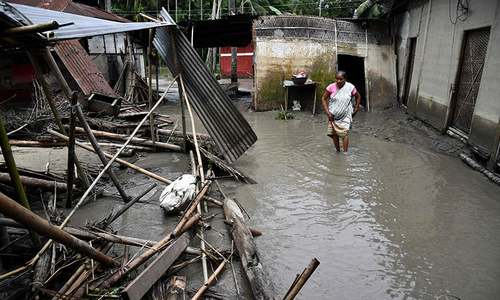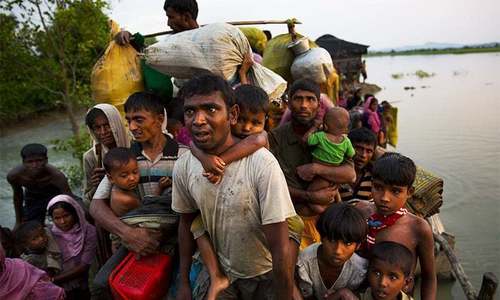BALUKHALI: At least 10 people have died and thousands of shanty homes have been destroyed by monsoon rains in overcrowded Rohingya refugee camps in Bangladesh’s southeast, officials said on Sunday.
Bangladesh’s meteorological department said the Cox’s Bazar district — home to nearly one million Rohingya Muslims who have fled a military crackdown in Myanmar — has seen at least 58.5 centimetres of rain since July 2.
An International Organisation for Migration (IOM) spokeswoman said heavy rains triggered mudslides in the refugee camps — which are mostly built on hill-slopes — destroying some 4,889 tarpaulin and bamboo shacks in the first two weeks of July.
More than 200 landslides have been reported since April in the camps, built near the border with Myanmar, and at least 10 people were killed, a UN report said, adding nearly 50,000 people have been affected.
In the last week alone, two Rohingya minors died and another 6,000 people were left without shelter because of heavy rains.
The UN said the schooling of some 60,000 children had been interrupted with over 750 learning centres partially damaged and five heavily damaged.
Displaced refugees said they were suffering as rain disrupted logistics and daily activity in the camps.
“It’s tough to go to food distribution centres by wading through a swamp of mud,” Nurun Jan, a Rohingya refugee, said. “Rains and gusty wind have made our life miserable.”
Refugees also described a shortage of drinking water and a looming health crisis due to flooded toilets, which foster disease outbreaks.
World Food Programme (WFP) spokeswoman Gemma Snowdon said they had to significantly increase assistance in the camps to cope up with the monsoon.
“So far 11,400 people have required the extra food assistance due to the heavy rains, compared to 7,000 during the whole of July 2018,” she said.
Last year the UN refugee agency moved 30,000 Rohingya out of areas considered at high risk of landslides and floods.
Published in Dawn, July 15th, 2019















































